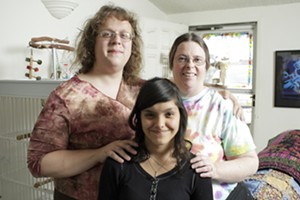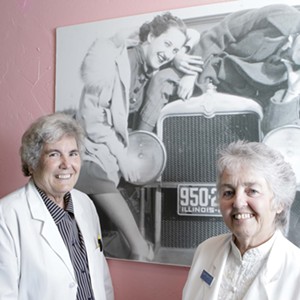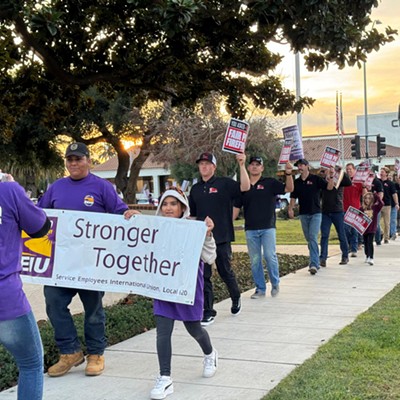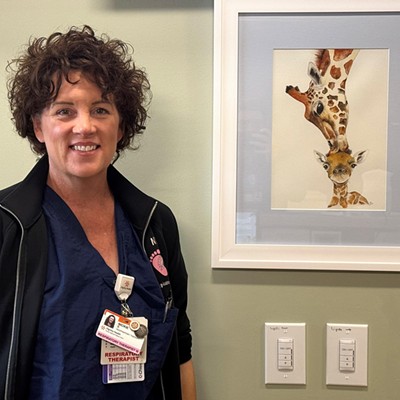
Lompoc’s Alex Taylor and Tamara Cravit met online in 1998, back before it was trendy to do so.
“We met in a chat room on IRC, how sad is that?” Alex said with a laugh.
The couple had already been planning a commitment ceremony in their synagogue when the California Supreme Court ruling legalizing gay marriage was announced. They were legally married on June 29, 2008.
Four months later, state voters passed Proposition 8, which stated that only marriages between a man and a woman would be recognized in California.
Gay marriage in California has had a contentious history, to say the least. In 2000, Proposition 22 passed and made marriage legal only between a man and a woman. Two bills in support of gay marriage passed the Assembly and Senate, but were quickly vetoed. Gay marriage was made legal last year after a narrow California Supreme Court decision. Voters passed Proposition 8 in late 2008, which famously overrode the court’s ruling and reaffirmed marriage as only between a man and a woman.
Once again, gay couples are in limbo. The battle is back before the California Supreme Court. Three lawsuits filed against Proposition 8 the day after it passed will be ruled on by June 3. Seven judges will decide whether Proposition 8 amended the state Constitution or just revised it, whether it violates the Constitution, and whether gay people already married legally remain so.
Taylor and Cravit have been eyeing recent development in Iowa and Vermont and are hoping it’s the start of a new trend. In Iowa, the state’s Supreme Court ruled that restricting marriage to heterosexual couples was unconstitutional, while Vermont’s state legislature overrode a veto by Gov. Jim Douglas and passed legislation allowing gay marriage.
Don’t ask, don’t tell
Carol—who asked that her and her wife’s real names not be used—is an 18-year veteran of the Air National Guard. She was working in Iraq as a contractor when Proposition 8 passed. That, she says, has thrown everything up in the air.
“It was really disappointing,” she said. “Even though we’re married, we wonder if we are going to stay married. Or are they going to change that? We are a family. It doesn’t feel good at all.”
The frustration in her voice is evident. Carol’s wife, Kim, grew up attending civil rights marches with her parents. She says it hurts her stomach every time she sees a “Yes on 8” bumper sticker.
“I grew up learning to be an advocate for tolerance,” Kim said. “Now I’m 50 years old, I finally got to marry someone I’m totally in love with, and the bigot down the street gets to say, ‘I’m uncomfortable with that.’”
She says she can’t understand why marrying the person she loves is such a threat to the Yes on 8 crowd.
“I think they were worried a horde of lesbians and a gaggle of gay men were going to take over the town,” she said. She laughed as she said it, but the sentence carried an undercurrent of anger.
“How would you feel if you couldn’t hold your wife’s hand in the grocery store? That’s really kind of—” Her voice caught.
“It’s sad.”

John Williams’ Star Wars theme was playing on the office speakers as Dr. Margaret Elfering and Dianne Barrett, R.N., smiled for the photographer. Silver haired in their white lab coats, the ladies made a cute couple.
Elfering and Barrett have been together for more than 34 years. They met at USC Medical Center where Elfering was an orthopedic intern and Barrett was head nurse in the operating room. Today, they divide their time between L.A. and Santa Maria, where they run a thriving practice.
Dr. Elfering said that as a normally private person, she wouldn’t typically be speaking in such a public way about her relationship, but with Proposition 8 passing, among other things, she felt it was finally time to speak up.
“Years ago, during the mid-’70s, I sat and watched a colleague come out on nationwide TV and make verbal points as to why she was who she was,” Elfering said. “I’ll never forget sitting there and knowing I didn’t have the courage to do that.”
Courage is an apt word: At the time her colleague came out, it hadn’t been long since homosexuality was still a crime in California and most other states.
“I’m not young anymore. I’ve lived through a horrendous change,” Elfering said. “When I was a child and realized I was a lesbian, it was against the law. You could get thrown out of school, you could lose licensure. This has been a very, very slow progression to equality under the law.”
Barrett said that during all the time she and Elfering have been together, there was a sense of hopelessness settling around her that she wasn’t even aware of.
“When I went down to get the application for the [marriage] license, I took the paperwork and went out to the car and started crying,” she said. “I didn’t know how much this meant to me. [After all those years], somewhere I had said to myself, ‘It’s not going to happen,’ so I got used to it. We were going to be like everyone else. I feel like everyone else, but now it’s going to be recognized.”
A matter of health
The progression toward equality and recognition continues to this day. One issue in particular that affects most families, gay or straight, is health insurance.
Kim and Carol are luckier than most gay couples: Carol’s civilian employer allows employees—not just the married ones—to include their partners and their partners’ children on their health insurance.
But it’s still not entirely equal, she pointed out. Because the federal government doesn’t recognize them as a married couple, she still has to pay federal taxes on her payroll deductions. For married couples, health insurance is a pre-tax deduction.
It’s this kind of treatment that the couples interviewed by the Sun say they want to see changed. For Elfering, part of her argument is for the security of her partner.
“Let’s say you’re married [as a heterosexual couple]. Maybe you and your spouse own a home together. Now, you get clicked in a car accident. What happens to your spouse if you die?” she said. “There’s no tax disadvantage, your bank account automatically goes to them whether it’s $30,000 or $300,000, because you have a joint commitment. Whereas if something happens to me, [because of Proposition 8], that’s not so.”
Living their lives together, the same as any other married couple, is what this is all about, Elfering added.
“Our life is pretty routine,” she said. “You get up in the morning, take a shower, get dressed, go to work. Maybe have lunch together, maybe not. You come home, you have dinner, you may go do something, swimming, bicycling, go on the computer—I think ordinary family life.”
In fact, Elfering added, her political views might surprise some people.
“It may sound strange, but I have rather conservative viewpoints,” Elfering said, prompting a laugh from Barrett. “Dianne’s probably more liberal than I am. But that’s probably the difference between the person who grew up in the city and who grew up in a rural environment.”
Kim agreed that she wants to be accepted for who she is, not the gender of who she married.
“I don’t introduce myself as [Kim] the Lesbian,” she said. “It’s just a part of who I am. ... If someone gets to know me, finds out I’m gay, and doesn’t like me, that’s on them.”
Religion or law?
Depending on who you talk to, gay marriage is either first and foremost a religious issue, or doesn’t belong under the mantle of religion at all.
“Marriage is a legal state, not a religious thing,” Elfering said. “Baptism is religious. Confirmation, Holy Communion, last rites—those things are church, not state. Somehow, marriage got mixed in with them.”
Jason Weatherred, an assistant pastor at Mercy Church in San Luis Obispo, said church members believe a traditional heterosexual family is the best for children and communities.
Although gay couples say it’s their right to marry, Weatherred said allowing them to do so would systematically eliminate religious rights and degrade the “sanctity” of marriage.
“Underneath that all, we as Christians do believe the Bible is really clear that marriage is between one man and one woman,” he said, “and we don’t believe that the definition of marriage should be blurred—that it should be ambiguous. We believe it should stay as it is, and we’re willing to support that as much as we can.”
He argued the issue isn’t about giving gay couples more rights, so much as what rights would be lost if marriage were redefined.
“We don’t feel that changing the definition of marriage … it’s not worth the cost of social respect [for gay couples],” he said.
Dr. Elfering has other ideas about protecting the sanctity of marriage.
“If you really want to protect marriage, abolish divorce. I personally don’t think that’s a reasonable answer,” she said, shaking her head at the thought, “but if it’s the sanctity of marriage they’re really serious about ... .”
For Lompoc’s Alex Taylor, the debate over gay marriage harkens back to separate-but-equal arguments.
“It’s frightening to me the initiative process can be used to take away the rights of a minority,” she said. “What’s next? Next month are you going to vote away my friends’ rights because they’re Jewish? Or my African American friends because they’re black?”
Ron Den Otter is an assistant professor in the Cal Poly Political Science Department. His expertise is in public law, and he said the issue over gay marriage is much the same as the issue championed by the racial civil-rights movement of the 1960s. However, he said, “there will probably never be the consensus on same-sex marriage here in America as there is on civil rights.
“Of course, I see it as a civil-rights issue, and I think people should see it as a civil-rights issue, but it’s obvious that a lot of people don’t see it as a civil-rights issue,” he said.
People younger than 30 generally don’t care whether gay people get married, he added. As new generations become more influential, it’s believed gay marriages will eventually be on par with straight marriages. But for now, there is seemingly no end to the legal battles.
Dr. Elfering said that while Proposition 8 was a setback, she sees recognition of her marriage as just a matter of time.
“This is a half step back,” she said. “The rights should be for every citizen in the United States. It’s equal rights, and it’s just a matter of continuing to push for those rights. Prop. 8 was half a step backwards, but it’s not the whole thing.”
Contact Staff Writer Nicholas Walter at [email protected]. New Times Staff Writer Colin Rigley contributed.










